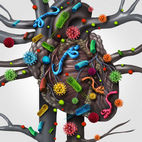Impact of Antimicrobial Treatment on Microbiological Findings |
|
| 13 November 2019 | |
|
In a study over a six years period, Halavaara and colleagues [1] compared the findings of valve culture and 16S rRNA gene PCR from patients with suspected infective endocarditis regarding the pre-operative antibiotic treatment and the impact of its duration. Antibiotic treatment was administered intravenously and had to be continuous for at least two weeks before admission. Samples taken during surgery were primarily from valve tissue and a few from pus. DNA isolation was done with EasyMag® (BioMérieux) at the early stage of the study and was then switched to the SelectNA™plus instrument (Molzym) followed by 16S rRNA gene PCR. For patients with less than two weeks antimicrobial treatment, 91% of PCR runs and 41% of the cultures were positive. In contrast, for patients with more than two weeks antimicrobial treatment, all valve cultures were negative while PCR was positive in 53% of cases. From negative blood cultures, PCR could detect the pathogen in 77%. Among the blood culture negative cases, the causative agents identified were Bartonella quintana, Coxiella burnetii and Tropheryma whipplei which were considered very rare in Northern Europe. The authors concluded that PCR greatly aided diagnostics particularly when culture remained negative. |
|
| Reference | |
| [1] Halavaara M, Martelius T, Järvinen A, Antikainen J, Kuusela P, Salminen US, Anttila VJ (2019) Impact of pre-operative antimicrobial treatment on microbiological findings from endocardial specimens in infective endocarditis. Eur J Clin Microbiol Infect Dis. (link) | |
| Product Information Technical Information |

